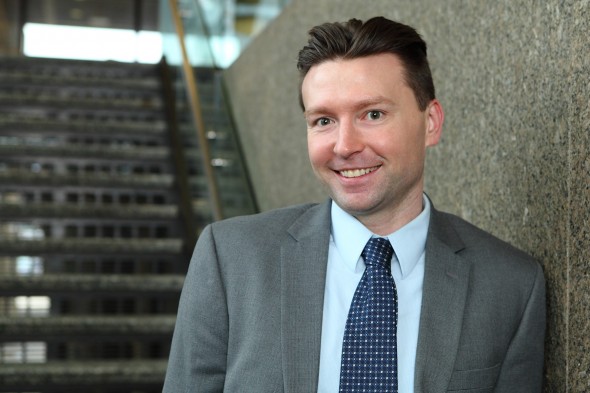Psychology behind place, politics

One aspect of Matt Motyl’s research is whether conservatives or liberals are happier. “Conservatives report, but liberals display, greater happiness,” says Motyl, assistant professor of psychology. Photo: Jenny Fontaine
Forget red and blue states, says Matt Motyl. Think red and blue neighborhoods instead.
“People are disproportionately likely to move to another neighborhood to find people who share their values,” said Motyl, an assistant professor of psychology. “So you find red and blue communities.”
He reported that finding for a Salon piece and a book chapter titled “Liberals and conservatives are geographically dividing” in the forthcoming Bridging Ideological Divides.
Speaking of red and blue, Motyl, who is in the psychology department’s social and personality area, wondered which political type more frequently gets the blues.
His answer is in a Science article he co-wrote, “Conservatives report, but liberals display, greater happiness.”
There’s a long research history of conservatives claiming they’re happier than liberals, Motyl said.
But his study of photos in the Congressional Record shows that more right-leaning congressmen flash apparently fake smiles, while liberal congressmen are more likely to display evidently genuine grins.
Also, conservatives more often use sad or negative words when speaking or writing for Twitter.
Motyl’s research was done during the Barack Obama presidency; he opines that conservatives “may be angrier or sadder because they’re not in power.”
One often hears someone say of a particular candidate, “If he wins, I’m moving to Canada.”
It’s hard to find data indicating that anyone follows through on this declaration, Motyl said. “Most people don’t move, but a lot threaten to,” he said.
Some take the threat seriously, though. He noted that Cape Breton Island in British Columbia is advertising to American tourists, “If Trump wins, we welcome you here.” Fox News dubbed it “the land of the flee.”
Research by Motyl and five colleagues showed that underlining climate change gives a boost to support for peace-making.
In Peace and Conflict: Journal of Peace Psychology, they argued that it’s possible “to get people to set aside their differences to work against something that affects everybody,” Motyl said.
In the case of global climate change, “that’s exactly what we found” when looking at right-wing Israelis and Palestinians living alongside them, he said.
On the other hand, he added, climate change might result in scarcer resources, with countries competing for them.
Examining such claims as “Virginia is for lovers,” Motyl and a colleague questioned whether “geographical or regional characteristics affect basic psychological processes.”
“Based on your attachment style, some places are going to be better than others,” he said.
“If everyone around you has different beliefs, why would you want to have close relationships with them?”
He made no judgment about the specific case of Virginia. “It was just a cute title,” he said of the article written for Social and Personality Psychological Science.
Pieces Motyl penned for Psychology Today and Slate had the same title: “Is Obama the Antichrist?”
The question brought to mind the period Motyl spent supervising the undergraduate honors program when he was pursuing a master’s degree at the University of Colorado in Colorado Springs.
“It’s an especially conservative area with lots of military bases, and the family of one student was military going back many generations,” he said.
Email from one of the student’s relatives cautioned her that Obama was from zip code 60606, “606” being the sign of the devil, and that Scripture warns that the Antichrist will be a person with darker skin.
Motyl is a native of St. Augustine, Florida. He earned a bachelor’s degree from Allegheny College in Meadville, Pennsylvania, a master’s from the University of Colorado and a Ph.D. from the University of Virginia. He came to UIC in 2014, and lives three blocks from campus.
He is a co-founder of CivilPolitics.org, which he describes as “a nonprofit that tries to bring together academic research and interventions to improve political discourse.”
Reproducibility is the holy grail of research, and a piece Motyl co-authored is highly rated.
It was named No. 8 of the Top 100 Stories of 2015 by Discovery magazine; No. 6 by Science News; No. 5 in “Altimetric 100,” Nature magazine’s top science stories of 2015; and runner-up for “Breakthrough of the Year” by Science magazine.
Categories
